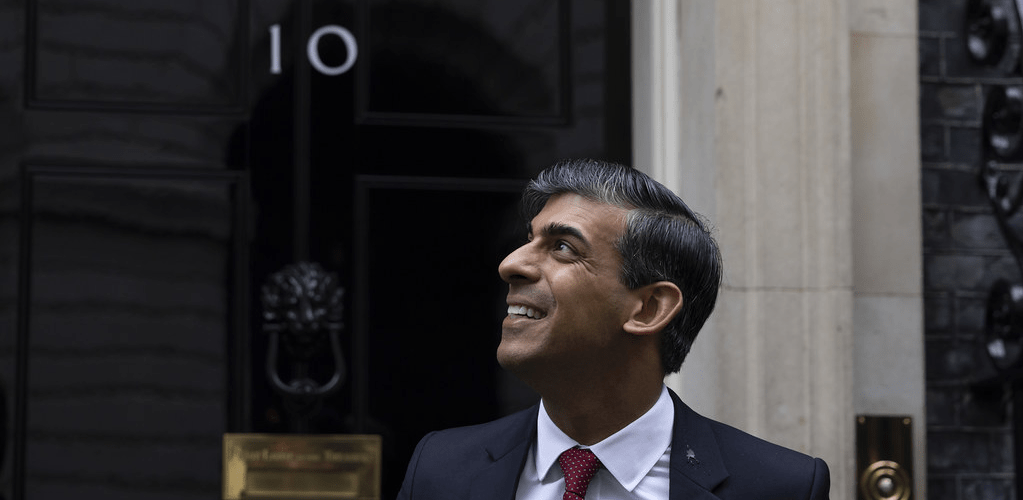What are the Conservatives really saying when they say ‘don’t surrender’ to the Labour Party?
What does it mean to talk of “fighting” and “surrender” in a democratic election? The use of these words by Rishi Sunak calls the democratic process into question.

R ishi Sunak and the Conservatives have gone from encouraging people not to vote for their opponents, to telling them “don’t surrender” to Labour. The Conservatives have said that a Labour vote would mean surrendering the economy, their pension and their children’s education, among others.
One image shows a family holding their hands in the air – apparently at gunpoint – with the accompanying text “Don’t surrender your family’s future to Labour”. Sunak tweeted this with the line “I will never stop fighting for this country”. So, what does it mean to talk of “fighting” and “surrender” in a democratic election?
War metaphors have a long history in politics. We can find references to “fighting” elections back in the 1830s in the Hansard archives. Just think about how we talk about election “victories”, running an “election campaign” or “conceding defeat”. These are all quite conventional and well-trodden, expressions we might use without even thinking of them as metaphorical.
But the use of “surrender” here takes this a step further, calling the democratic process into question. By framing a vote for Labour as “surrendering”, it suggests that the incoming government is not legitimately and democratically elected, but rather a hostile takeover that should be resisted.
War metaphors are themselves pervasive. A study in 2005 found that around 15% of all articles in news magazines made use of them. They draw on a basic set of knowledge and express urgency and negativity to stimulate an emotional response, grabbing attention (and headlines) in the process.
Metaphors of battles and war received much attention during the COVID pandemic, where studies examined the effects and implications of a war framing. In that context, war metaphors were found to increase negative emotions and worries. They also influenced right-wing participants in one study to accept or prefer more bellicose measures in tackling COVID.
Metaphors involve a partial likening between the target (the thing we are talking about) and the source (the thing we are likening it to). When the far-right talks of “a swarm of migrants” and invokes a metaphor of “migrants are insects” they are typically referring to elements like “large numbers”, or “lack of control”, rather than “essential for pollination and therefore survival”. When we say one thing is like another, we say it is like it in some ways, but not all.
In the case of “politics is war”, the speaker might be stoking division to try and force the audience to view the choices as binary and mutually exclusive – and, they hope, to get people to support them (“corral the troops”).
The Conservatives frame the Labour Party as a threat to the individual (don’t surrender your family) and country (don’t surrender the economy). This plays up political division, while downplaying that Labour and Labour voters are part of the same country and society as Conservatives.
I can’t stress this enough.
— Rishi Sunak (@RishiSunak) July 1, 2024
Labour will take more of your money. Labour will raise your taxes. Don’t surrender your family's finances to Labour. pic.twitter.com/Q9q6GRBHxL
Does it matter? Is it only words?
Language always matters in politics, and metaphors are especially persuasive. We know from academic research that they can influence how we think and what responses we might consider legitimate. We also know that once we think of one thing in terms of another (once we have a metaphorical frame), it is not so easy to switch it off.
The “surrender” metaphor could lead to tension and polarisation with consequences lasting far beyond the election result, and beyond the individual career of any one politician.
Just look at who else has used these metaphors recently. Donald Trump has repeatedly spoken to his supporters of war in politics, with his campaign now putting the phrase “never surrender” on official merchandise next to his mugshot. Perhaps this is what inspired Sunak’s team.
On January 6 2021, Trump’s supporters stormed the US Capitol to prevent a legitimate president-elect taking office, as Trump repeated false claims that the election was stolen. In this case, the suggestion that a democratic process is something to not “surrender” to, but rather to resist, had real, physical consequences. The Capitol attackers injured approximately 140 police officers and caused around US$1.5 million (£1.19 million) in damage.
War metaphors are powerful persuasive tools. The problem for society is the legacy they leave – especially when they have been pushed to the edges. According to a recent poll, 32% of the UK see loss of trust as the biggest threat to democracy. Framing a democratic election as “surrendering” delegitimises that event and contributes to that distrust. The short-term gain of attention and emotional appeal from supporters comes at a long-term cost of social cohesion and trust.

Sources:
▪ This piece was originally published in The Conversation and re-published in PUBLIC SQUARE UK on 2 July 2024. | The author writes in a personal capacity.
▪ Cover: Flickr/Number 10. (Licensed under a Creative Commons Attribution-ShareAlike 4.0 International License.)







[Read our Comments Guidelines]